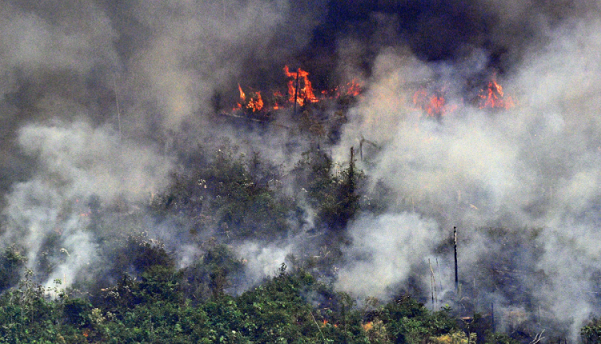
The Amazon is burning. Why the world is worried

For decades, the Amazon has been recognized as an important repository of biodiversity and natural resources, not only for the local communities, but also for the entire world.
Sadly, it has in recent weeks grabbed world headlines for destructive fires that have ravaged deep into the forest.
Environmentalists warn that the continued burning of the Amazon spells doom for the earth, which relies heavily on the rainforest for the sustenance of life.
Fires
Due to the Amazon’s importance on earth, the recent fires have caused widespread concern with calls for world leaders to do more to put out the fires immediately.
A record number of fires have been ravaging the South American rain forest, mostly in Brazil. The fires made it into the recently concluded G7 Summit in the French city of Biarritz.
At the end of the Summit pledged $22 million to help fight the forest fires.

Cause of fires?
Wild fires are a regular natural occurrence in the Amazon at particular times of the year, especially in the dry seasons.
Environmentalists are however attributed the current record number of fires to farmers whose greed pushes them to set the forest on fire to clear land for pasture, as well as loggers.
Importance of the Amazon?
The Amazon is the world’s largest tropical rainforest, covering over 5.5 million square kilometres.
It spreads vastly along South America, spanning across Brazil, Bolivia, Peru, Ecuador, Colombia, Venezuela, Guyana, Suriname and French Guiana.
More than 1,100 tributaries converge to form the mighty Amazon river, which is the largest river by discharge volume of water in the world.
Reportedly, around 20 percent of the world’s fresh water is found here, flowing through the length of the Amazon into the Sea.
The Amazon River provides an important habitat for countless species of animals, including over 2,500 species of fish.
Generally, the Amazon rainforest is home to around 40,000 plant species, 1,300 bird species, 3,000 fish species, 430 mammals and a whopping 2.5 million different insects.
Due to its vastness, the Amazon is considered to be the lungs of the earth. The rainforest reportedly produces about 20 percent of the earth’s oxygen and takes in enormous amounts of carbon dioxide emitted by human activity.
Beyond the fires, environmentalists around the world are routing for concerted efforts to save the Amazon from damage.
There are fears that the important ecosystem could be reduced to swathes of dry land, accelerating climate change. A continued damage of the Amazon could also lead to the loss of thousands of animal and plant species that depend entirely on the forest’s survival.
Furthermore, damage to the forest spells disaster for indigenous human populations that call the Amazon home.







